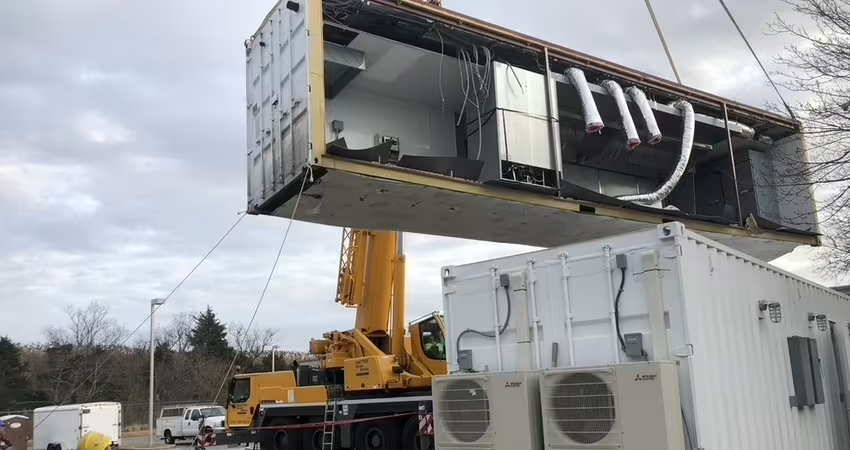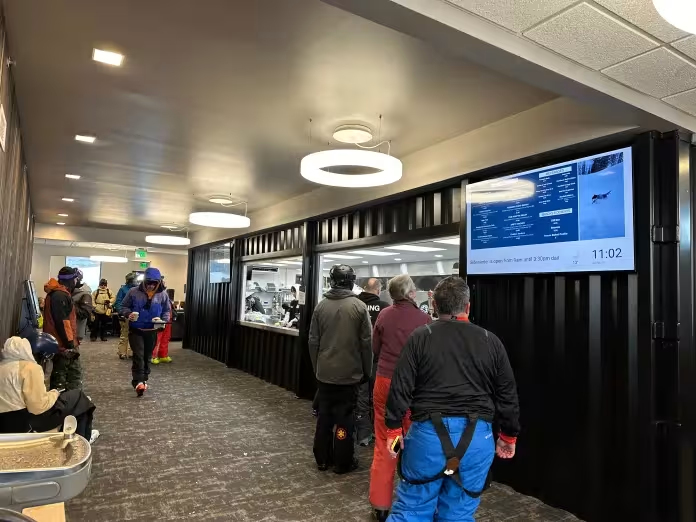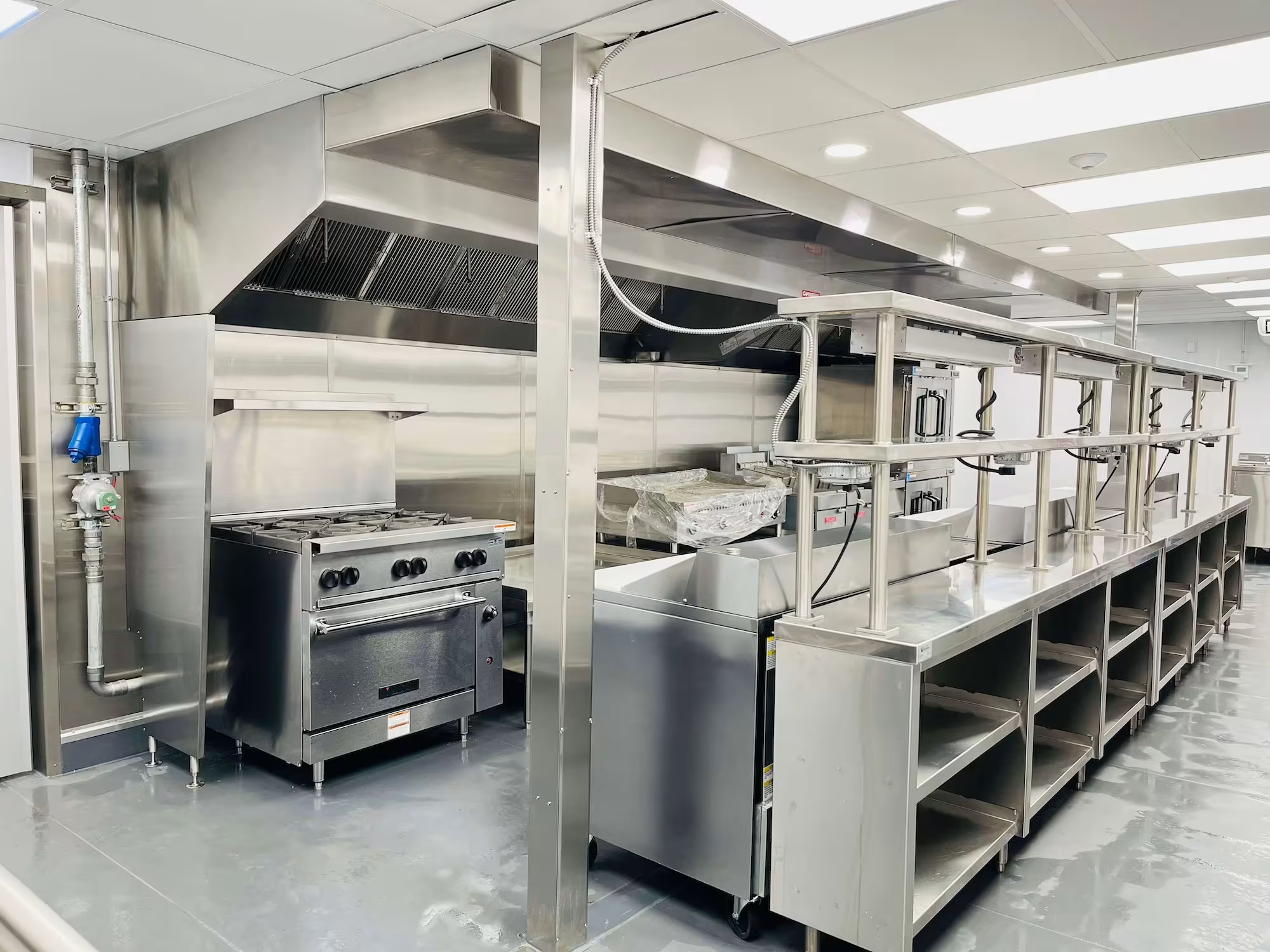Sustainability is rapidly becoming a priority in commercial kitchen design. Traditional construction methods generate significant waste, consume large amounts of energy and materials, and often lead to costly delays and rework. As operators look to reduce their environmental impact and meet modern ESG expectations, modular construction offers a cleaner, more efficient alternative.
Historically, commercial construction produced high levels of landfill waste: up to 61% of all construction and demolition materials in the late 1990s and early 2000s. This era of overconsumption pushed builders and architects to pursue more responsible practices, paving the way for solutions that reduce, reuse, and recycle materials throughout a building’s life cycle.
Modular construction aligns perfectly with these goals. By shifting fabrication to a controlled factory environment, it minimizes waste, improves precision, accelerates project timelines, and reduces on-site disruption. For hospitality operators, this means faster deployment, lower embodied carbon, and kitchens engineered to meet strict codes without excessive resource use.
In this article, we explore how modular construction supports sustainable commercial kitchen design and how ContekPro delivers permanent, code-compliant modular kitchens that help hotels, resorts, and QSRs meet today’s environmental and operational standards.
Modular construction is a building method where finished, code-compliant sections called modules are manufactured off-site in a controlled factory and then transported to the project location for final assembly. For commercial kitchens, these modules integrate the structural shell, full MEP systems, ventilation, fire protection, and equipment under consistent, factory-level quality control.
Because fabrication happens off-site, construction of the building, walls, utilities, hoods, make-up air, and fire suppression can occur at the same time that site work and utility preparation take place. When the site is ready, modules arrive, are set with a crane, connected mechanically and electrically, and commissioned in a fraction of the time required for traditional construction.
Modular kitchens are engineered to meet IBC/IMC codes and local AHJ requirements, with Type I hoods, grease ducting, and fire suppression integrated directly in the factory. This streamlines inspections, reduces rework, and eliminates many common causes of project delays.
This approach is particularly effective for commercial kitchens, which require precise coordination of HVAC, plumbing, electrical systems, gas lines, and heavy-duty equipment loads. Modular construction delivers higher accuracy, standardized engineering, improved airflow and insulation performance, and better long-term efficiency. The result is a kitchen that is faster to build, more consistent in quality, and more sustainable to operate.

In the US, construction refuse accounts for one-third of the country's waste. It's easy to see why it makes sense to substitute traditional building methods for sustainable alternatives.
Modular construction minimizes waste by shifting fabrication into controlled factory environments. This lean production decreases resource expenditures by 36% and reduces waste materials like asbestos, chemical solvents, and adhesives by 70%. When compared to traditional construction, modular builds leave a smaller carbon footprint. And when these structures are properly maintained, their lifespan can last for decades, further increasing their usefulness.
Standardized cut lists, CNC nesting, and closed-loop material management dramatically reduce offcuts, errors, and rework — cutting both material waste and carbon-heavy duplicate deliveries. For commercial kitchens, right-sized mechanical systems, high-R thermal envelopes, and ENERGY STAR equipment further reduce operational energy use from day one.
Design tactics:
In 2018, the EPA reported that demolition was the primary source of construction debris. Luckily, modular construction adheres to the principle of "Circular Economy." A Circular Economy is a model utilizing fewer resources and materials at all stages of production for as long as possible. It recaptures and reuses what would otherwise be wasted on on-site construction projects.
This method makes it possible to dismantle modular structures and reassemble them in a different location as a "mobile property." It puts less strain on the environment, reducing the effort associated with manufacturing and transportation since it requires fewer on-site deliveries.
Modular commercial kitchens can be relocated, reconfigured, or repurposed as operational needs evolve. This flexibility is especially valuable for hospitality groups managing seasonal peaks, renovations, or phased expansions.
Design tactics:

In 2020, the building and construction sector was responsible for 36% of global energy consumption. Recycling counters this statistic by decreasing the energy normally spent gathering and processing natural resources like wood and metals. Instead, these and other materials are taken from existing structures, refined, and turned into new objects or substances.
The EPA’s Sustainable Materials Management (SMM) model helps identify construction materials that can be recovered and reused and the same principles apply to modular units. Modular commercial kitchens, in particular, are highly recyclable across several material categories:
Each year, construction sites discard more than 380 tons of plastic, yet only 9% is properly recycled. As landfill capacity tightens, industry leaders must look to more sustainable building approaches such as modular commercial construction to minimize waste and reduce environmental impact.
Design tactics:
Modular construction lowers both embodied and operational carbon. Factory precision reduces material overuse, onsite machinery, and fuel-heavy contractor travel. Once operational, commercial kitchens benefit from high-performance mechanical integration and energy-efficient equipment selections.
Examples of carbon-reducing systems include:
Design tactics:
Modular kitchens are engineered to ASHRAE 154 (performance), NFPA 96 (fire safety), and local AHJ requirements. Adding DCKV and considering heat-recovery (where code allows) significantly improves energy performance over the building lifecycle.

Our modules are manufactured in a controlled environment where all critical systems are pre-engineered and quality-checked before shipment. This includes:
Factory integration minimizes rework, accelerates inspections, and ensures mechanical systems operate efficiently from day one.
ContekPro offers modular kitchens specifically developed for hospitality service models:
These repeatable templates deliver predictable performance while allowing customization to brand standards.
Our six-phase delivery model: Discovery → Contract → Design & Planning → Permitting → Production → Installation resolves code paths, mechanical requirements, and utility coordination early, reducing field changes and permitting delays. After crane-set, our team supports hook-up, testing, commissioning, and staff orientation for a smooth handoff.
Every ContekPro kitchen is engineered to meet long-term sustainability goals through:
These systems improve indoor air quality, reduce operational carbon, and maximize equipment lifespan.
ContekPro modular kitchens can be delivered 30–50% faster than traditional construction. The benefits are immediate:
Shorter schedules directly translate to a smaller environmental footprint.
Factory-built manufacturing ensures tighter tolerances, cleaner mechanical integration, and superior long-term durability compared to conventional builds. The result: commercial kitchens that operate more efficiently, stay cleaner, last longer, and require fewer resource-intensive repairs.
.avif)
Modular construction offers one of the most effective paths toward building sustainable, high-performance commercial kitchens. By shifting fabrication into controlled factory environments, operators can dramatically reduce waste, lower carbon emissions, and accelerate project delivery — all while improving quality, safety, and long-term efficiency. For hotels, resorts, QSRs, and institutional foodservice providers, modular kitchens provide a smarter, greener alternative to traditional construction.
ContekPro’s engineered-to-order modular kitchens bring these advantages to life. With factory-integrated MEP systems, optimized ventilation, durable materials, and streamlined installation, our solutions help operators meet sustainability goals without compromising performance or reliability. As the hospitality industry continues to prioritize environmental stewardship, modular construction and partners like ContekPro will play a key role in shaping the future of commercial kitchen design.
If you're ready to explore a more efficient and sustainable way to build, ContekPro can help you get started. Check out our commercial kitchen layouts and get a quote for your next project.
Yes. Modular kitchens significantly reduce construction waste, minimize onsite disruption, and use less energy during both construction and operation. Factory precision also improves insulation, ventilation performance, and equipment efficiency, lowering long-term carbon emissions.
Most modular kitchens can be delivered 30–50% faster than traditional builds. While timelines vary by project, much of the work happens off-site, so modules arrive nearly complete and can be installed and commissioned in a matter of days once site utilities are ready.
Absolutely. Modular kitchens are engineered to IBC, IMC, NFPA 96, and local AHJ requirements. Factory integration of Type I hoods, grease ducts, make-up air, fire suppression, and MEP systems ensures compliance and reduces field rework during inspections.
Yes. One of the key sustainability advantages of modular construction is adaptability. Kitchens can be relocated, expanded with additional modules, or reconfigured as operational needs change, extending their usable life and reducing demolition waste.